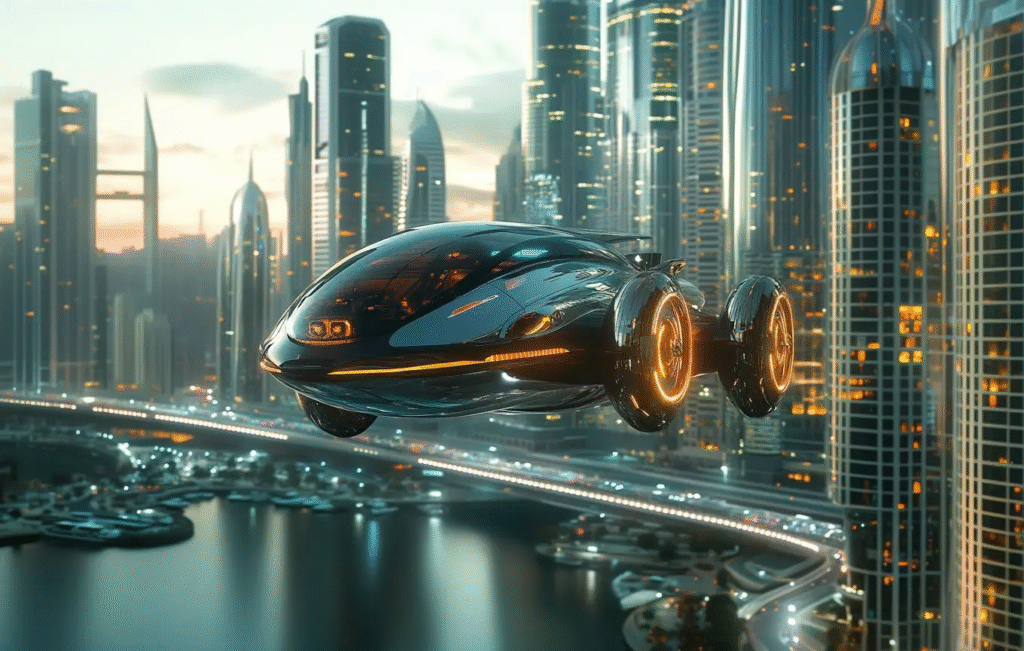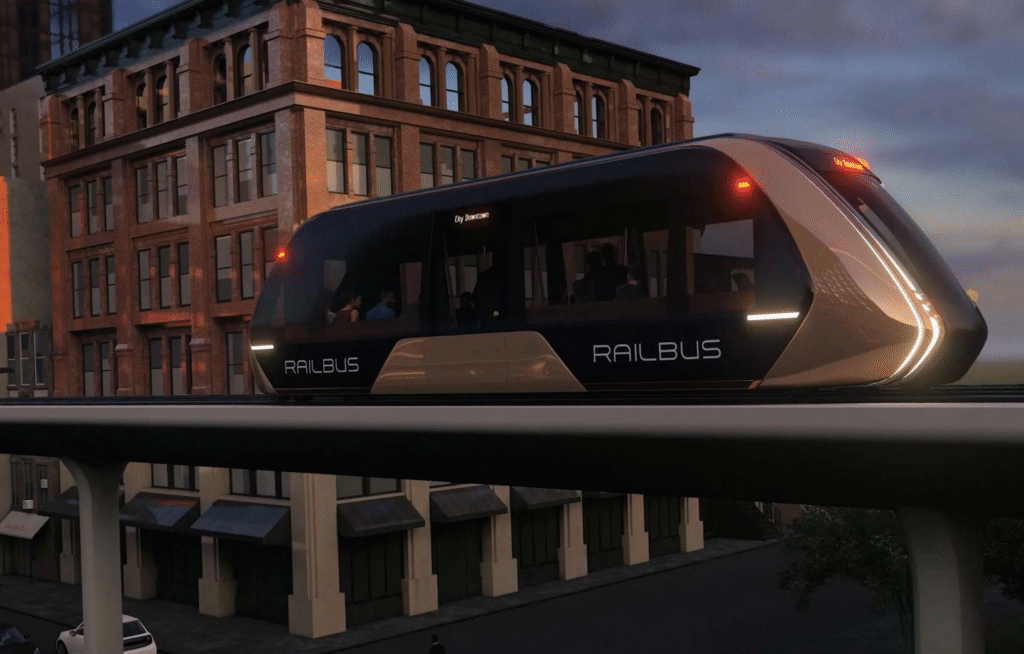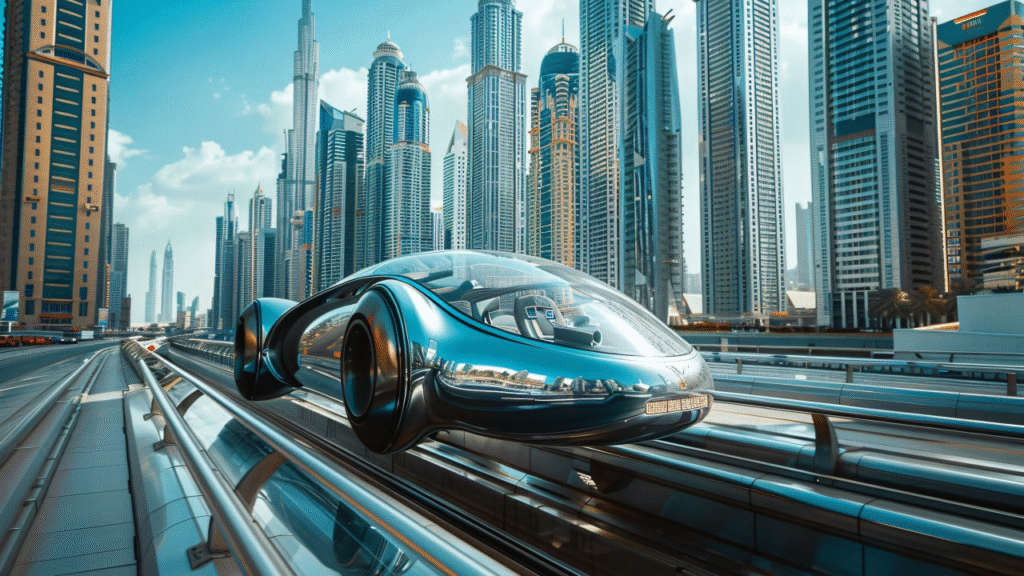Now Reading: Inside Dubai’s Jaw-Dropping Transportation Revolution Happening in 2025
-
01
Inside Dubai’s Jaw-Dropping Transportation Revolution Happening in 2025
Inside Dubai’s Jaw-Dropping Transportation Revolution Happening in 2025

Table of Contents
Dubai has always been a city known for its bold ambitions and world-class infrastructure. In 2025, the city is pushing boundaries once again with a series of transportation megaprojects that are set to transform how residents, tourists, and businesses move around. From futuristic hyperloop systems to driverless public transport, Dubai is cementing its position as a global leader in smart mobility.
Let’s dive into the major transportation projects reshaping Dubai in 2025.
1. Dubai Hyperloop: Speeding into the Future

One of the most talked-about projects is the Dubai Hyperloop, designed to connect Dubai to Abu Dhabi in just 12 minutes. Using cutting-edge vacuum tube technology, the hyperloop will transport passengers and cargo at speeds exceeding 1,000 km/h, completely transforming intercity travel.
Currently undergoing its final testing phases, the hyperloop aims to become commercially operational within the next two years. Once active, it will reduce traffic congestion on highways and promote a more sustainable, energy-efficient mode of travel.
Experts believe the hyperloop will benefit not just commuters, but also businesses moving high-value goods between the two cities, strengthening Dubai’s status as a trade and logistics hub.
2. Dubai Metro 2030 Extension: Serving More Communities

Dubai’s iconic Metro network is also expanding in 2025 under the ambitious Metro 2030 plan. The network will gain new lines connecting residential communities that were previously underserved, such as Dubai Silicon Oasis and Jumeirah Village Circle.
In total, over 60 km of new tracks are being laid, adding more than 20 stations to the network. These extensions aim to reduce car dependency, cut carbon emissions, and make public transportation a realistic option for thousands of new residents.
Authorities say the metro’s daily ridership could increase by 40% once these extensions go live, making it one of the most advanced and efficient metro systems in the Middle East.
3. Autonomous Taxis: Driverless Cars on Dubai’s Roads

In 2025, Dubai is taking a giant leap toward the future with the launch of autonomous taxis. After successful pilot tests in 2023 and 2024, these driverless vehicles will now operate on select routes across the city.
Using advanced sensors, AI algorithms, and 5G connectivity, autonomous taxis are expected to improve road safety and reduce congestion. These taxis will offer a safe, reliable, and affordable option for commuters while complementing existing public transportation systems.
Dubai’s Roads and Transport Authority (RTA) plans to deploy at least 1,000 autonomous taxis by the end of 2025, aligning with the city’s vision of becoming 25% autonomous by 2030.
4. Al Maktoum International Airport Expansion: A New Global Gateway

The Al Maktoum International Airport, already one of the largest airports in the world, is seeing a massive expansion in 2025. The expansion will increase passenger handling capacity to 260 million annually, making it a crucial part of Dubai’s transportation network.
The new terminal facilities, upgraded runways, and advanced baggage systems will create smoother travel experiences and support the city’s growing tourism and business sectors. Additionally, a dedicated high-speed rail link will connect the airport directly to central Dubai, cutting travel time for passengers and freight.
This project is expected to generate thousands of new jobs and stimulate the local economy, reinforcing Dubai’s role as a global aviation hub.
5. Green Mobility: Electric Buses and Sustainable Infrastructure

Sustainability is at the heart of Dubai’s transport strategy for 2025. The city is rapidly replacing diesel-powered buses with fully electric buses, investing in renewable energy charging stations, and encouraging eco-friendly practices among residents.
In partnership with international technology companies, Dubai aims to make its entire public bus fleet electric by 2030, with a significant milestone reached in 2025 as more than 500 electric buses hit the streets.
Not only will these buses lower carbon emissions, but they will also offer quieter, smoother rides, making public transport more attractive for daily commuters.
6. Bicycle Highways: Encouraging Healthier, Greener Commutes

Dubai is also promoting healthier lifestyles through a growing network of cycling highways. By 2025, the city will have over 800 km of dedicated cycling tracks, connecting key commercial and residential hubs.
The bike highways will feature shaded pathways, water stops, and smart lighting to encourage safe and comfortable rides even during the summer. These initiatives support Dubai’s vision to get more people out of their cars and onto bicycles, reducing both traffic and air pollution.
Impact on Dubai’s Residents and Economy
These megaprojects are not just about infrastructure; they are about reshaping how people live and work in Dubai. With faster, greener, and more efficient transportation options, residents will save time, enjoy better air quality, and experience greater convenience.
Businesses will benefit from smoother logistics, easier employee commutes, and access to new markets. Tourists will find it easier than ever to explore Dubai’s many attractions, from its pristine beaches to futuristic shopping malls.
In turn, the city’s economy is expected to grow further, attracting foreign investment and reinforcing Dubai’s reputation as a global innovation leader.
Looking Ahead
Dubai’s 2025 transportation megaprojects showcase a powerful vision: a smart, sustainable, and inclusive city. By blending cutting-edge technology with ambitious planning, Dubai is creating a blueprint for other cities to follow.
While challenges remain — from funding to climate adaptation — Dubai’s track record suggests it will continue to deliver world-class infrastructure on time. As these megaprojects progress, the rest of the world will be watching and learning from Dubai’s bold moves.
Read More:- Deyaar’s Latest Announcement Shakes Up the UAE Property Market



















